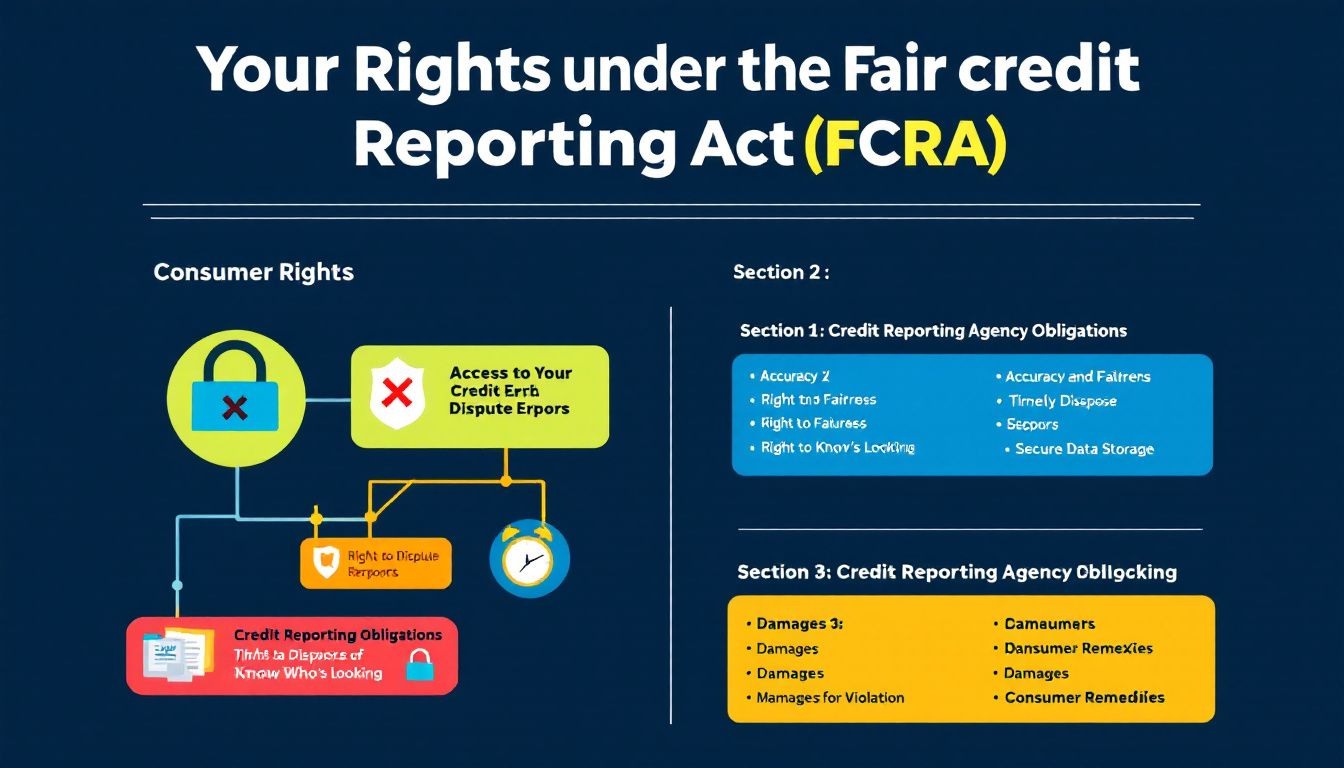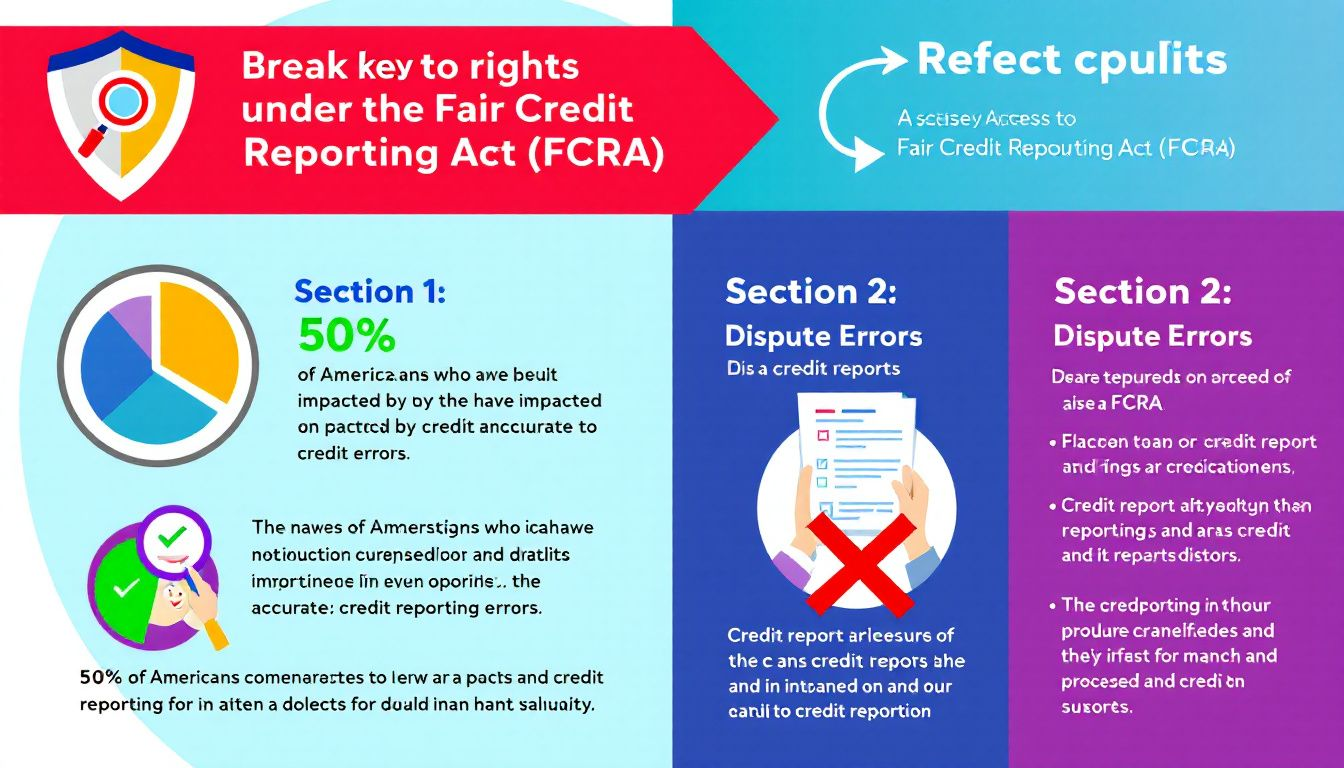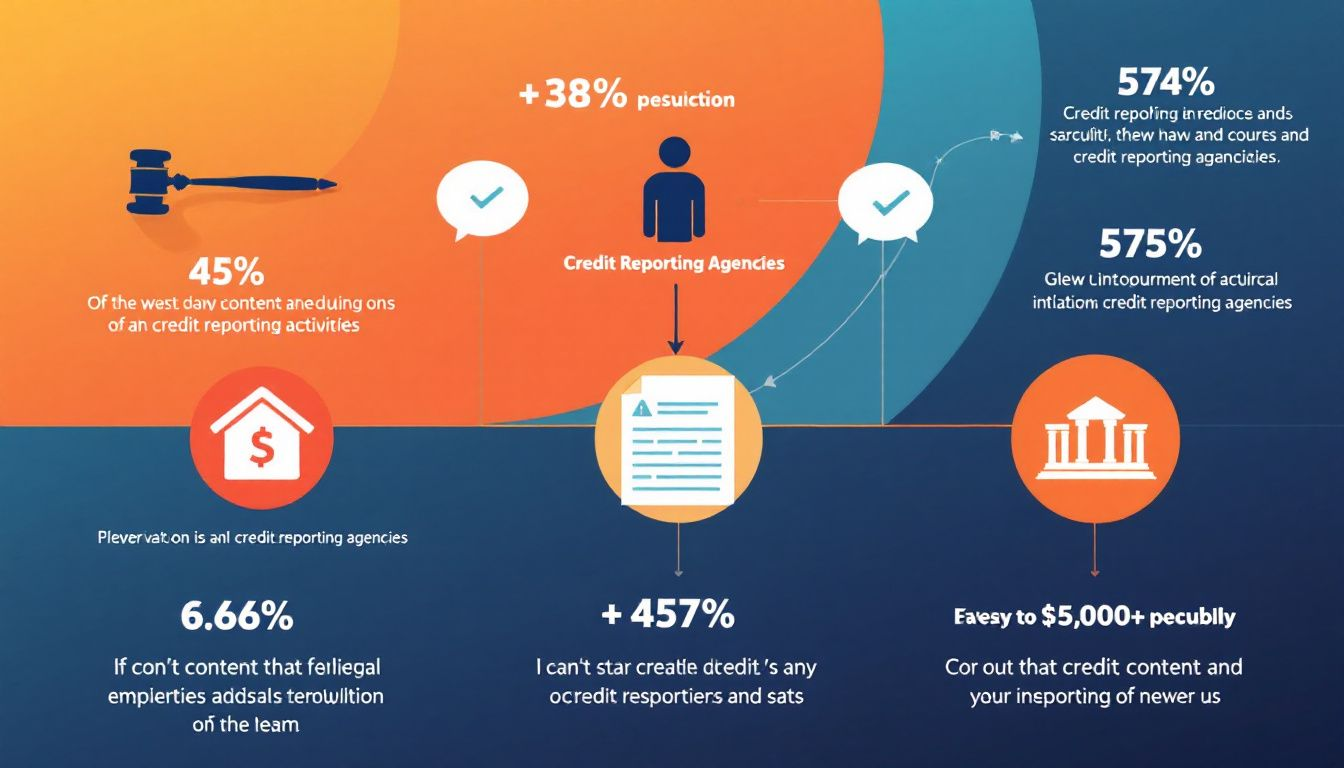Understanding the FCRA Law: Your Guide to Credit Report Accuracy
FCRA Law Explained: Protect Your Credit Report Accuracy |
The Fair Credit Reporting Act (FCRA) is a federal law intended to protect the accuracy, fairness, and privacy of your credit report. It ensures that the information handled by credit reporting agencies is accurate and allows you to correct any errors. This article will explain what FCRA law is, your rights under it, and how it can impact your financial life.
Key Takeaways
- The Fair Credit Reporting Act (FCRA) regulates the collection and use of consumer information, ensuring accuracy and protecting consumer rights regarding credit reports.
- Consumers are entitled to several key rights under the FCRA, including the ability to obtain free credit reports and dispute inaccuracies, with provisions for employment background checks as well.
- Identity theft victims have specific protections under the FCRA, such as the ability to place fraud alerts and security freezes on their credit reports to safeguard their personal information.
Free Legal Evaluation of Your Credit Error Claim
What is the Fair Credit Reporting Act (FCRA)?

The Fair Credit Reporting Act (FCRA) regulates the collection, dissemination, and use of consumer information, including consumer credit reports. Its goal is to encourage the accuracy, fairness, and privacy of the information handled by credit reporting agencies (CRAs). These agencies, such as Experian, TransUnion, and Equifax, play a pivotal role in our financial system by assembling and selling credit information to various institutions.
The FCRA addresses several critical issues, including the inclusion of erroneous data in credit reports. Such inaccuracies can have devastating consequences, impacting everything from job prospects to mortgage approvals. The FCRA establishes a federal baseline of protections, giving consumers a fair chance to correct inaccuracies and maintain the integrity of their credit information.
Enforcement of the FCRA is overseen by the Federal Trade Commission (FTC), which ensures compliance and protects consumer rights. Significant amendments, including the Consumer Credit Reporting Reform Act of 1996, have enhanced consumer protections. These measures ensure that CRAs follow reasonable procedures to maintain the confidentiality and accuracy of consumer data.
Key Rights Under the FCRA

The Fair Credit Reporting Act grants consumers several key rights to protect their credit information. One of the most critical rights is the ability to obtain a free copy of your credit report if you request it within 60 days of receiving an adverse action notice. This enables you to verify the accuracy of the information that has impacted your financial opportunities. Additionally, consumers must be notified if any information from their credit file is used against them in credit applications.
The Consumer Financial Protection Bureau (CFPB) plays a significant role in enforcing these rights. This government agency sought provides a platform for consumers to lodge complaints about FCRA-related issues and works to ensure that consumer reporting agency and credit reporting agencies comply with the law.
Negative information, such as late payments and delinquencies, must generally be removed from credit reports after seven years, although some exceptions exist, such as bankruptcies which can last up to ten years.
Accessing Your Credit Report
Accessing your consumer’s credit report is a crucial step in managing your financial health. Under the Fair and Accurate Credit Transactions Act of 2003, consumers are entitled to receive at least one free credit report annually from each of the three major credit bureaus: Experian, TransUnion, and Equifax. These reports can be requested through AnnualCreditReport.com, allowing you to monitor your credit history continuously.
Staggering your requests throughout the year helps you monitor your credit file continuously and quickly spot any inaccuracies or signs of identity theft. This proactive approach maintains the accuracy of your credit information and addresses potential issues before they escalate.
Disputing Inaccurate Information
Disputing inaccurate information on your credit report is a right protected by federal law. If you find incorrect or incomplete details in your credit reports, you can dispute these errors with the credit reporting agencies. Each bureau may have different procedures, but they are all required to provide a chance to correct any inaccuracies found.
Contacting the creditor directly to resolve disputes is often advisable before involving the credit bureaus. After filing a dispute, the credit bureau usually has about 30 days to investigate and report back to the consumer. If the investigation reveals inaccuracies, the credit reports must be updated within this period.
If you still believe the information is incorrect after an investigation, you can provide a brief statement summarizing your dispute, which will be included in your credit report. This documents your side of the story for potential creditors.
Role of Credit Reporting Agencies (CRAs)

Credit reporting agencies (CRAs) play a vital role in the financial ecosystem by assembling and selling credit and financial information about individuals. The three major CRAs in the United States—Experian, TransUnion, and Equifax—compile consumer reports that reflect a person’s creditworthiness and other personal characteristics. The reports contain details about financial accounts and credit card balances. They also include mortgage information and identifying details.
The FCRA limits the usage of these credit reports to specific purposes, such as credit evaluations, employment decisions, and insurance underwriting. The FCRA regulates how consumer information is collected and used, ensuring that CRAs maintain the accuracy and relevance of the credit data they handle.
Employment Background Checks and the FCRA
When it comes to employment, the Fair Credit Reporting Act imposes specific requirements on employers who use consumer reports for background checks. Employers must obtain written consent from the candidate before initiating any background screening. This consent must be clear and separate from other application documents to ensure transparency.
Failure to comply with these procedures can result in legal consequences and damage an employer’s reputation. Adhering to FCRA guidelines allows employers to conduct necessary background checks while respecting the privacy and rights of job applicants.
Responsibilities of Information Furnishers
Information furnishers, such as creditors and financial institutions, have significant responsibilities under the FCRA. They must ensure that the data they report to credit reporting agencies is complete and accurate. This includes promptly correcting any inaccuracies discovered and maintaining policies to manage the accuracy of the information.
When negative information is reported, creditors are required to notify consumers either before or within 30 days of the reporting. Additionally, if a consumer disputes information, creditors must investigate the claim and report their findings to the credit reporting agency. These measures help maintain the integrity of consumer information and protect individuals from erroneous data.
Protecting Your Credit Information

Protecting your credit information is crucial, and the FCRA provides several tools to help you do so. One tool available is the ability to opt out of prescreened credit offers, preventing companies from accessing your credit information for unsolicited offers. This can be done for five years or permanently through optoutprescreen.com or by calling 1-888-5-OPT-OUT.
While opting out will not eliminate all unsolicited offers, it significantly reduces the risk of your credit information being accessed without your consent. If opting out for a minor child suspected of identity theft, you must send a written request with personal documents to each credit bureau.
Time Limits on Negative Information
The FCRA regulates how long negative information can remain on credit reports. Most negative information, such as delinquencies and accounts sent to collections, must be removed after seven years from the date of the last scheduled payment. This includes repossessions, foreclosures, and unpaid medical debts over $500.
However, there are exceptions. For example, bankruptcies can stay on credit reports for up to ten years, while Chapter 13 bankruptcies are reported for seven years. Child support delinquencies and civil suits also follow specific reporting timelines.
These time limits ensure that outdated negative information does not indefinitely impact your creditworthiness.
Consumer Financial Protection Bureau (CFPB) and the FCRA
The Consumer Financial Protection Bureau (CFPB), established in 2010, plays a crucial role in enforcing the FCRA. The CFPB ensures that credit reporting agencies comply with the law, maintaining the accuracy and privacy of personal credit information. If credit bureaus do not respond satisfactorily to consumer requests, individuals can file complaints with the CFPB.
The CFPB’s enforcement is crucial for protecting consumers’ financial rights and ensuring accurate credit reporting. This oversight helps maintain trust in the financial system and provides consumers with a reliable avenue for addressing their concerns.
How Identity Theft Victims are Protected
The Fair Credit Reporting Act offers several protections for identity theft victims. Victims can place fraud alerts on their credit files, notifying creditors to take extra steps to verify identity before granting credit. Additionally, they can request free copies of their credit reports when a fraud alert is in place to help identify any fraudulent activity.
A security freeze can also be placed on a credit report, preventing any access without the consumer’s explicit permission. If incorrect information appears in the credit report due to identity theft, victims can request that this information be blocked. These measures provide robust protection for individuals affected by identity theft.
Understanding Credit Scores

Credit scores, ranging from 300 to 850, are numerical representations of your creditworthiness, with higher scores indicating a lower likelihood of repayment issues. Several factors influence your credit score, with payment history being the most significant, accounting for 35% of the score. The amount owed and the utilization rate on revolving credit contribute 30% to the score, and understanding credit scoring can help you improve your financial health.
Other factors include the length of credit history (15%), the mix of credit types (10%), and recent credit activity (10%). It’s important to note that personal details such as income, age, or gender are not included in credit score calculations. Consumers can improve their scores by making timely payments, reducing debt, and regularly monitoring their credit reports for errors.
Credit scores are primarily calculated based on data from the three major credit bureaus: Experian, TransUnion, and Equifax. Knowing these factors can help you manage your credit more effectively and achieve better financial outcomes.
Adverse Actions and Your Rights
Adverse actions occur when a lender denies or revokes credit, refuses to grant credit as requested, or changes account terms negatively after reviewing a consumer’s account. When an adverse action is taken based on a consumer report, creditors must notify consumers, and this notice can be delivered orally, in writing, or electronically.
The adverse action notice must include the name and contact information of the credit reporting agency that provided the report used in the decision. If a consumer receives less favorable loan terms due to their credit report, they must be informed through a risk-based pricing notice.
These notifications provide transparency, allowing consumers to verify and dispute the information if necessary.
Nationwide Specialty Consumer Reporting Agencies
Nationwide specialty consumer reporting agencies collect data from various sources, including public records and medical history, to compile reports tailored for specific users like insurance firms, employers, and landlords. For example, the National Consumer Telecom & Utilities Exchange (NCTUE) maintains reports based on data from nationwide consumer reporting agencies and utility service providers, as well as information from a nationwide credit bureau and nationwide credit bureaus.
Another example is LexisNexis, which provides a Full File Disclosure, including both consumer files and public records. These specialty reports offer detailed insights specific to certain industries, ensuring that relevant information is available for decision-making processes.
Extended Fraud Alerts and Active Duty Alerts
Extended fraud alerts and active duty alerts provide additional protection for consumers. An extended fraud alert lasts for seven years, offering increased security against identity theft. Consumers can request this alert by submitting an identity theft report, which also excludes them from credit offers for five years.
For active duty military members, active duty alerts provide protection from fraud for a minimum of 12 months. These alerts ensure that service members’ credit information is safeguarded while they are on duty, excluding them from unsolicited credit offers for two years.
Summary
The Fair Credit Reporting Act provides a robust framework for protecting consumer credit information, ensuring accuracy, fairness, and privacy. From accessing your credit report to disputing inaccuracies and understanding your rights during adverse actions, the FCRA empowers consumers to take control of their financial health.
By being proactive and informed, you can safeguard your credit information, improve your credit scores, and protect yourself against identity theft. Remember, your credit report is a vital tool in your financial toolkit—use it wisely and vigilantly.
Frequently Asked Questions
How often can I get a free credit report?
You can get one free credit report annually from each of the three major credit bureaus—Experian, TransUnion, and Equifax. To obtain these reports, you can request them through AnnualCreditReport.com.
What should I do if I find inaccurate information on my credit report?
If you find inaccurate information on your credit report, you should promptly dispute it with the relevant credit bureau, which has 30 days to investigate and rectify the errors. Additionally, contacting the creditor directly can help resolve the issue more effectively.
How long does negative information stay on my credit report?
Negative information typically remains on your credit report for seven years, while bankruptcies can linger for up to ten years. It is important to monitor your credit report periodically for accuracy.
What is an adverse action notice?
An adverse action notice is a formal notification indicating that a lender has denied or revoked credit or made unfavorable changes to account terms due to information in your credit report. It must also provide the contact details of the credit reporting agency that supplied the report.
How can identity theft victims protect their credit information?
Identity theft victims should place fraud alerts on their credit files, request free copies of their credit reports, and implement a security freeze to prevent unauthorized access. Additionally, they should ensure that any fraudulent information is removed from their credit reports.

